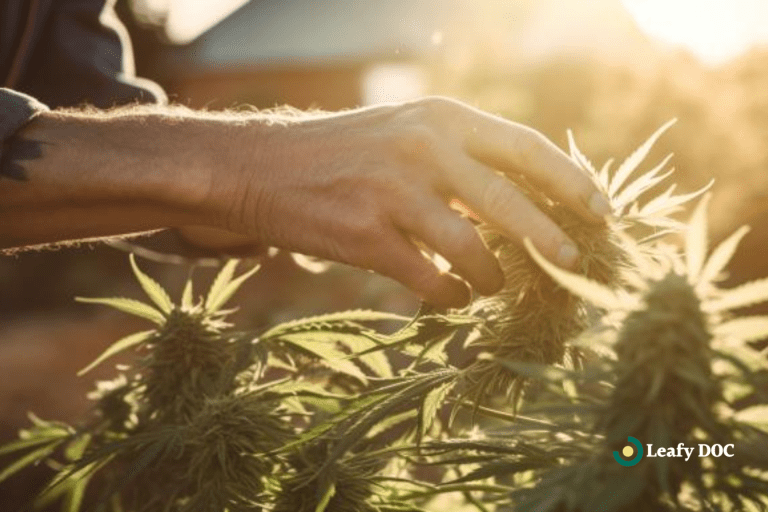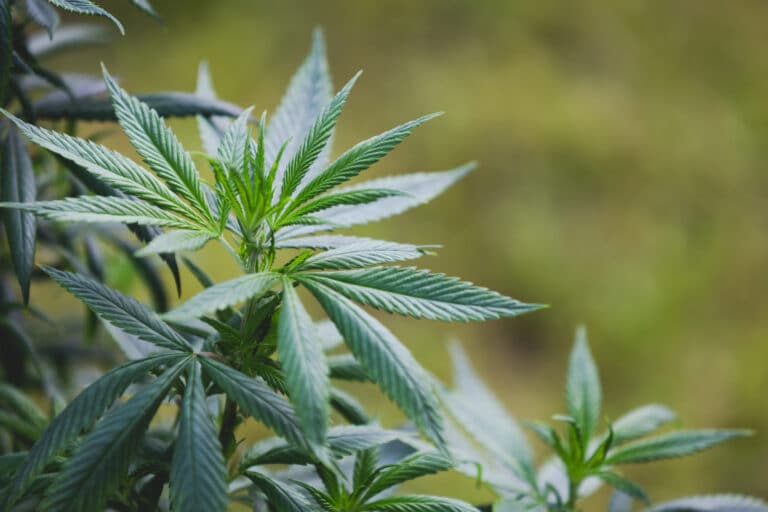Stomach Ulcers
Can medical cannabis help with symptoms of stomach ulcers? Find out below.
What are Stomach Ulcers?
Stomach ulcers, also known as peptic ulcers, are open sores that develop on the stomach lining, small intestine, or esophagus. They occur when the protective layer of mucus that covers the stomach lining is weakened or damaged, allowing stomach acid and other digestive juices to erode the tissue underneath. Stomach ulcers can be caused by several factors, including bacterial infection, prolonged use of nonsteroidal anti-inflammatory drugs (NSAIDs), excessive alcohol consumption, and smoking.
Are there signs & symptoms of Stomach Ulcers?
Symptoms of stomach ulcers include abdominal pain, bloating, nausea, vomiting, and weight loss. Treatment typically involves medication to reduce acid production in the stomach, antibiotics to treat any bacterial infection, and lifestyle changes to avoid exacerbating the condition. Surgery may sometimes be necessary to remove the ulcer or repair the affected tissue.
Types of Ulcers
Ulcers are open sores that can occur on internal and external parts of the body. They can be mild or severe. An ulcer is a type of crater-like wound and can develop outside or inside the body. Ulcers develop when tissue erodes, which has a variety of causes, but luckily there are successful treatment options. Ulcer symptoms can include pain, nausea, heartburn, or itching, depending on the affected area. Treatment may consist of acid reducers, antibiotics, antiviral drugs, lifestyle changes, and in extreme cases, surgery.
There are seven primary types of ulcers: arterial, diabetic foot, esophageal, genital, mouth, peptic, and venous. Let’s learn about a few stomach-related ulcers, their causes, symptoms, and treatments.
Esophageal
The most common cause of esophageal ulcers is acid reflux. This condition occurs when stomach acid backs up into the esophagus and wears away the lining of the esophagus.
The symptoms of esophageal ulcers include:
- heartburn
- difficulty swallowing
- chest pain
- nausea
- vomiting
- excessive saliva
If you have an ulcer caused by GERD, your doctor will prescribe PPIs or H2 blockers that reduce the amount of acid the stomach produces.
If an infection causes your ulcer, a doctor may prescribe antibiotics or antiviral medications.
Making lifestyle changes, such as quitting smoking and drinking fewer acid-rich liquids, may benefit esophageal ulcers.
Mouth
Mouth ulcers are small lesions that develop in your mouth. The sores may be painful and swollen.
Treatment for mouth ulcers may include:
- topical corticosteroids
- anti-inflammatory medications
- antibiotic mouthwash
- avoiding certain foods
- pain relievers
The causes of mouth ulcers include:
- trauma to the mouth
- cuts or burns from eating
- a food allergy
- hormonal changes
- an iron or vitamin B12 deficiency
- a weakened immune system
- Crohn’s disease or celiac disease
- oral cancer
Peptic
There are two main types of peptic ulcers.
- Gastric ulcers-stomach
- Duodenal ulcers-upper part of the small intestine
There are two leading causes of peptic ulcers.
- Bacterial infection: Infection that can cause inflammation and damage your stomach linings.
- Nonsteroidal anti-inflammatory drugs (NSAIDs): NSAIDs, including aspirin and ibuprofen, are typically used to treat pain.
Some common symptoms of peptic ulcers include:
- stomach pain
- bloating
- heartburn
- nausea
- vomiting
Peptic ulcers can bleed, which can be severe.
If an ulcer is bleeding rapidly, symptoms can include the following:
- black, sticky stool
- bloody stool
- bloody vomit
- fainting
Treatments for peptic ulcers include:
- Proton pump inhibitors (PPIs): PPIs block acid production in your stomach, allowing the ulcers to heal.
- Antibiotics: If H. pylori caused your ulcer, you need antibiotics to eliminate the infection.
- NSAID cessation: If NSAID causes the ulcer, talk with your doctor about alternative pain medications.
Can medical cannabis help?
The cannabinoids found in the cannabis plant can activate the endocannabinoid system in the human body and may help many chronic issues, including stomach ulcers. Cannabis activates CB1 receptors in the central nervous system and CB2 receptors in organs, muscles, and tissues. Cannabinoids can directly influence our ability to maintain homeostasis.
CB1 receptors are responsible for large and small bowel muscles and digestion in the intestines. Activating the CB2 receptors targets immune cells that can reduce intestinal pain and inflammation. Cannabinoids can even interact with other receptors influencing everyday gastrointestinal tract functions.
Timna Naftali conducted a study that followed thirty patients with Crohn’s and recorded their disease severity before and after cannabis use. Researchers found that many users could decrease inflammation medications, including steroids. Approximately three-fourths of participants said they experienced reduced symptoms and daily bowel movements.
Another study discusses the cannabis plant’s potential for helping to relieve digestive inflammation and its anti-inflammatory properties by activating the endocannabinoid system, a fat-based system of self-made neurotransmitters. When CB2 receptors line the intestinal tissue, a P-glycoprotein transmitter will help decrease the body’s inflammatory and autoimmune responses.
Recent studies on the endocannabinoid system suggest that many IBS patients may have clinical endocannabinoid deficiency (CED). An ongoing theory is that these deficiencies could come from genetics, injuries, and diseases.
Research on obese mice has proven a connection between the microbiome, gut, and brain. The microbiome of the small intestine, large intestine, and brain health are all crucial factors for IBS patients. The obese mice given doses of THC had improved microflora in the gut compared to mice who received the placebo.
MMJ Patients with Stomach Ulcers may see the following benefits:
- Pain management improvement
- Decreased anxiety and depression
- Appetite Increase and regulation
- Reduced need for regular steroid use
- Decrease in diarrhea
Medical marijuana is commonly found to possess significant anti-inflammatory and antioxidant properties, which can help with chronic pain management reasonably quickly. Cannabinoid receptors bind to the brain and peripheral nerve cells and help regulate how you see and feel the pain to reduce symptoms. Medical cannabis, therefore, as opposed to other drugs, appears to be an excellent alternative to treat and manage pain due to inflammation.
Recent studies from medicine and health sciences professionals suggest that certain cannabis products may effectively treat an overactive immune system. It can connect with the cannabinoid receptors of the body to combat the proinflammatory t-cell responses needed. It has been used to treat rare skin conditions, Crohn’s disease, neuropathic pain, particularly autoimmune disease, inflammatory bowel disease, acute psychosocial stress, and many others. Maintaining homeostasis in the body will make you less likely to develop future stomach ulcers. We recommend discussing MMJ options for stomach ulcers and related conditions with your doctor if you want a new treatment plan.
Last Updated: June 14, 2024
Get Your Medical Card
Connect with a licensed physician online in minutes
Table of Contents
Keep Reading
-
Managing Anxiety: THC Vs CBD
Discover the ultimate anxiety-buster: THC vs CBD for anxiety. Take control of your mental well-being today and find out which one is best for you. Click here to conquer anxiety once and for all!
-
Mastering Pruning Techniques For Cannabis Plants
Discover the ultimate guide to mastering pruning techniques for cannabis plants! Maximize yields and boost plant health with expert tips and tricks. Click now to enhance your cultivation skills.
-
What are the Weed Shakes?
Want to know why your body shakes after smoking weed? Our latest blog post has got you covered! We’ll explore the world of weed shakes, from what causes them to whether they’re something to worry about. Whether you’re a cannabis newbie or a seasoned smoker, our blog post is a must-read.



